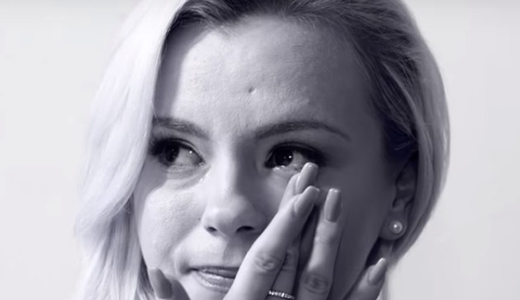Former pornography star Bree Olson—who’s also known for her stint as one of actor Charlie Sheen’s former “goddesses”—left the adult film world behind in 2011. But five years later, the now 29-year-old still struggles profoundly with the stigma of the onscreen work she pursued beginning at age 19. In fact, she’s not sure if she’ll ever completely recover from the ongoing negative influence that her decision to participate in porn still exerts over her life.
Olson talked openly—and at times tearfully—about her current perspective on porn for the Real Women, Real Stories project. In a video titled “Bree Olson: Her Untold Story” posted on the group’s Facebook site, Olson began by saying she feels like she’s now wearing the 21st-century equivalent of the scarlet letter.
“So, when I go out, I feel as if I’m wearing [the word] ‘slut’ across my forehead. The names that people have called me—it’s as if you could take out those names and print them and put a ribbon around my whole body of all the names and things that people say to me on the Internet, that’s how I feel when I walk outside the door. … So I have really gotten to the point where there are days to weeks at a time where I don’t leave my house because I don’t feel like facing the world. … It’s really easier for me just to stay inside my house and not put myself out there for [getting] hurt.”
She goes on to say that it’s not just the words or judgments of strangers that she has to endure, but that it often impacts potential new friendships as well. “I get so disappointed when I go out and I meet a new friend, and then it turns out they don’t want to be my friend anymore.” Later, she adds, “People treat me as if I am a pedophile. They don’t treat me like an ex-sex worker. They treat me like I would somehow be damaging to children.” When asked how she would like to be treated, the tears come, and through them she says, “I wish that people would treat me how they would treat a married registered nurse with 2.5 kids in Indiana. That’s how I wish people would treat me.”
Near the end of the video, Olson voices her advice to teens who might think that participating in pornography is viable career path. “I send a very strong message to young girls: Don’t do porn. … I understand it, you want to embrace your sexuality. You wanna say screw the Man, screw whatever, like, I can do whatever I want with my body. But you’re just gonna have a life of crap in front of you. … You can never work with children after you do porn. You can never work in a medical field after you do porn. And these are things that teenage girls don’t think about.”
As clear-eyed and sober as she is about the aftereffects of engaging in pornography, however, Olson still can’t bring herself to criticize the industry that she readily admits has been so damaging to her. The problem, she says, isn’t pornography itself, but how people respond to knowing that she’s been in it. “You think that you’re a teenager, it’s fun, you’re making money—and that’s the truth, it is, and there’s nothing wrong with porn—but how people treat you for the rest of your life, it’s not worth it.”
In an article for dailydot.com, Olson reiterated a similar message, saying, “The money isn’t worth the pain of what society will put you through forever. Porn didn’t hurt me. The way society treats me for having done it does.”
I applaud Bree Olson’s courage for talking so personally and candidly about the high costs of pornography for those who try to establish a more “mainstream” (a word she uses elsewhere in the video) life afterward. She’s absolutely right to warn young girls that they can’t even begin to understand the possible consequences they’ll have to endure down the road if they choose a path similar to Olson’s.
For all that, though, it’s still troubling to me that she feels compelled to say “porn didn’t hurt me” when its legacy in her life—by her own admission—so obviously has. I’m well aware in writing those words that Olson would likely categorize me as part of the problem she’s talking about here, just another of the many voices who’ve hurt her. That’s not my intention.
But I think Bree Olson’s admissions here can be a powerful springboard to the question of who porn does hurt, and why. In culture drowning in sexualization and sensual imagery, those are important issues to keep grappling with. And as Christians who believe that God has created us with profound dignity in His own image, who believe that sexual expression between a husband and wife is one of his greatest gifts, and who understand why it’s so damaging when that gift it used out of its intended context, we have something important to contribute to that conversation.
Bree Olson’s sad but powerful story reminds us both of the importance of our participation in that conversation, as well as the need to do so with as much gentleness, grace and compassion as we possibly can.






Recent Comments